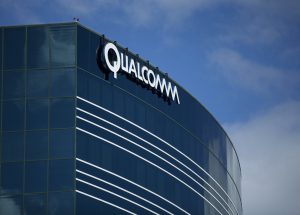 Qualcomm Inc. (NASDAQ:QCOM) is now suing several Apple Inc. (NASDAQ:AAPL) contract manufacturers for failure to pay patent royalties. Qualcomm filed its complaint in federal court in San Diego. The company says that four Asian contract manufacturers aren’t complying with their obligations to pay for the use of its patented technology. The four companies being sued are Foxconn Technology Group, Pegatron Corp., Wistron Corp., and Compal Electronics Inc.
Qualcomm Inc. (NASDAQ:QCOM) is now suing several Apple Inc. (NASDAQ:AAPL) contract manufacturers for failure to pay patent royalties. Qualcomm filed its complaint in federal court in San Diego. The company says that four Asian contract manufacturers aren’t complying with their obligations to pay for the use of its patented technology. The four companies being sued are Foxconn Technology Group, Pegatron Corp., Wistron Corp., and Compal Electronics Inc.
Apple doesn’t directly license technology from Qualcomm. Instead, Apple pays its contract manufacturers enough to cover the royalties and the contractors make the royalty payments to Qualcomm. Qualcomm’s licensing fee is calculated as a percentage of the selling price of the phone. Charging based on the price of the phone is an industry-standard practice that has been established in law, the chipmaker says.
Apple argues that the licensing fee should be based on a percentage of the price of the type of semiconductor used. The iPhone maker says that the price of the whole phone encompasses innovation that has nothing to do with Qualcomm. Apple said, “As we’ve said before, Qualcomm’s demands are unreasonable and they have been charging higher rates based on our innovation, not their own.”
Apple recently announced that it would stop giving its contractors money for the royalty payments while its lawsuit against Qualcomm plays out. Earlier this month, Apple Chief Executive Officer Tim Cook said on an earnings call that the company is taking a “principled stand” against Qualcomm. Apple said in its statement, “We’ve been trying to reach a licensing agreement with Qualcomm for more than five years but they have refused to negotiate fair terms.”
Qualcomm says in its complaint that the decision resulted in the manufacturers stopping their payments for the royalties. The company was forced to slash its third-quarter forecasts last month due to uncertainties over the royalty payments. The chipmaker blamed Apple for dragging its contract manufacturers into the dispute, saying, “We’re suing to make the point that others shouldn’t be used by Apple to advance this agenda they have of attacking us.”
